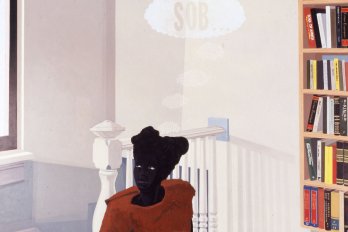jenin—When I visited a refugee camp in Jenin last fall, there were rows of new homes going up, painted in creamy colours that contrasted weirdly with the drab concrete all around them. This development has replaced an enormous mound of rubble—the detritus of the so-called “battle of Jenin” in 2002, the fiercest clash of the ongoing Palestinian intifada.
Not surprisingly, on one newly plastered wall a poster had already been put up commemorating Abdel Aziz Rantisi, the militant Hamas leader slain in an Israeli missile strike in Gaza last April. But right next door, I saw something less expected: small groups of local people—grizzled old men in soiled shirts and pretty young women in long frocks and headscarves—filing into a dimly lit storefront office so they could register to vote.
All this was several weeks before Yasser Arafat fell into what would prove to be a fatal illness. People were preparing to vote, in other words, before an election had been announced.
“Many people are registering but they don’t think anything will change with a vote,” one young woman told me. “No one believes in anyone or anything.” The Palestinian Central Elections Commission (cec), one of the few truly independent Palestinian public institutions, set up more than a thousand registration centres in the West Bank, the Gaza Strip, and Jerusalem during September and October. They got no help from Israel. To do their work, cec staffers had to circumvent walls and cross Israeli army checkpoints. Some prospective voters needed to skirt past military patrols to register; others had to work around the days when they were unable to leave their houses because of an Israeli curfew. In northern Gaza last September, when Israel launched one of its largest military operations of recent years, registration centres remained shuttered for weeks.
In East Jerusalem, which is predominantly Palestinian, Israeli authorities staged almost daily raids on the cec’s registration centres before closing them down altogether and threatening their staff with arrest. Israel annexed East Jerusalem after it was conquered in the 1967 war and does not recognize Palestinian claims there. Nonetheless, as one Western diplomat remarked to me somewhat slyly, Israel had made no similar moves to crack down on people registering for November’s US presidential election.
Yet, despite everything, the would-be voters came. Almost 70 percent of the roughly 1.6 million Palestinians eligible to vote registered. An observer mission mounted by the US-based National Democratic Institute (ndi)—of which I was a member—described the technical quality of the registration process as “unusual, if not unique, in a conflict zone.”
When news of Arafat’s illness ripped round the world a few weeks later, speculation suddenly intensified about who would replace him, and how. There was talk of a “national unity” government brokered among the Palestinian factions, including both Arafat’s Fateh and Hamas. Inevitably, with so many of the factions armed, there were also rumblings of a Palestinian civil war. But the relative success of the voter-registration exercise portends another scenario for shaping a new leadership for the post-Arafat era: holding elections for both a new president and a new legislature, which was last elected in 1996.
Almost everyone involved in the conflict has long favoured Palestinian elections in principle, of course. Yet, as a practical matter, as long as Arafat was around, Israel and the U.S. worked to block elections in which he would almost certainly have received a renewed mandate. Arafat’s own cronies, meanwhile, did not want parliamentary elections because they were worried that Hamas, which boycotted the 1996 elections, would dismantle Fateh’s legislative majority.
As this article was going to press, the Palestinian Authority was rushing toward a presidential election, set for January 9, with the enthusiastic support of George Bush and the unlikely support of Israel. But regardless of the result, presidential elections without parliamentary elections won’t be enough to change the dismal dynamic in the region. Parliamentary elections would give the factions a place at the political table without the threat, or use, of arms. Elections would not demilitarize the conflict, but they might begin an evolution in Hamas away from the Kalashnikov and toward the ballot box.
There is currently a debate within Hamas, not widely reported outside the region, about shifting its focus into the electoral arena. No one should be misty-eyed about this. Mahmoud a-Zahar, Hamas’s political leader in the Gaza Strip, who is sometimes described as a “moderate” in this debate, once told me that he saw Western civilization as a metastasizing cancer, consuming all in its path.
However, during the registration drive it was Hamas rather than Fateh that supported the process by shepherding its supporters out to the centres. Hamas has already said that it would participate in municipal elections slated for December, and has hinted that under the right circumstances it might put forward candidates for legislative seats. However, at the moment, the Palestinian Authority’s current leadership has done little more than issue a vague promise for parliamentary elections in the first half of 2005.
Unfortunately, other than funding the cec’s voter registration program, the international community has done next to nothing to build Palestinian democracy. The Palestinians themselves are skeptical about the prospects for democratic renewal. The quasi-state that Arafat built fits the model of corrupt and autocratic regimes typical throughout the Arab world. Paradoxically, if there is an element of pluralism in Palestinian politics, it can be put down to the strength of the violent militias, including Hamas.
Yet a closer look suggests that Palestinians may be the Arab world’s best democratic bet. The leading Palestinian expert on public opinion, Khalil Shikaki, states that by a wide margin Palestinians have told pollsters they preferred the Israeli or the American system as a model for a sovereign Palestinian state. Unlike other Arabs, Palestinians have watched democracy work at close quarters, and though their own media are closely controlled, they have access to the boisterous and argumentative Israeli press.
In focus groups conducted by ndi earlier this year, even Hamas supporters advocated a multi-party legislature. Very few said they favoured a clerically dominated government in the style of the Ayatollahs’ Iran, perhaps because they understand that their movement, even today, is very much in a minority among Palestinians. Most Hamas supporters said they were drawn to the faction’s incorruptibility and its commitment to resisting Israeli occupation, not to its religious or political vision.
The alternative facing Palestinians (and the world) in the post-Arafat era is not between men of peace and men with guns. No leadership that has stood aloof from what Palestinians call “resistance” to Israeli occupation will have much legitimacy to rule, or, for that matter, to strike a deal with Israel. The only real choice is between a new leadership that wins by force of arms, and one that wins, with international support, at the ballot box. Anyone who still nurtures hope for eventual peace between Israel and Palestine will pray for the latter.





